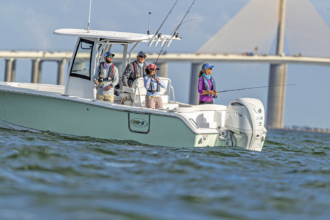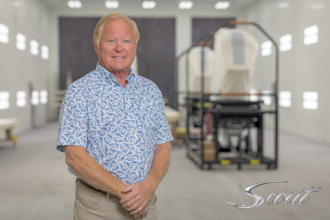Threats, Lies & Audiotape
Many reasons have been cited for the loss of manufacturing jobs throughout the nation. Trade imbalances. Recession. Outsourcing. And so forth.
And nowhere, of course, has the manufacturing community been hit harder than in Michigan, where more than 200,000 jobs were lost between 2000 and 2005. Detroit, alone, lost more than 100,000 jobs during that period. Now, the state is investigating the most recent “threat” to manufacturing jobs: fair and balanced marine dealer-manufacturer agreements.
Michigan’s legislature — in discussions over Senate Bill 1188 that would mandate and enforce dealer-manufacturer agreements — is wavering over passing a bill because opponents have grossly fueled the fear that it would create even more job loss.
“We’re very concerned about maintaining what’s left of our manufacturing base,” says Tom Martin of Michigan’s Department of Labor and Economic Growth. “Michigan has been criticized because we’ve lost so much of it.”
Largely playing to those fears, boat builder Thomas Slikkers of S2 Yachts, Inc., Holland, Mich., and David Dickerson of the National Marine Manufacturers Association, testified against the bill before the Economic Development Small Business and Regulatory Reform Committee on June 14, alongside Martin and Jim McBryde of the Michigan Economic Development Corp.
The manufacturers based their testimony — obtained on audiotape by Boating Industry — on a simple, yet ominous premise: The bill will lead to job loss. Unbeknownst to the committee members, however, their testimonies were based on what some might construe as inaccuracies, exaggerations and, in some cases, outright lies.
No one, however, could tell Boating Industry how this bill would cause job loss in the manufacturing sector — other than by way of the threat that Slikkers laid down on the state: “We as a manufacturer have the option of producing our boats in any state we want to,” he stated during the testimonies. “And we’d like to continue staying here, but if the environment gets to the point where it’s really not conducive for us to be here as a manufacturer, we’ll go where there’s interest in having those kinds of jobs. We have long relationships in this state — some of them over 20 years — with dealerships. And I’m willing to tell you that if this kind of language is in place, unfortunately, we would discontinue doing business with those dealers.”
Where it all began
Ironically, discontinuing business with dealers is exactly where this battle began. For as many as 50 years, according to Marine Retailers Association of America President Phil Keeter, who also testified at the hearing, dealers have been working to level the playing field between themselves and manufacturers. At the top of that list has been protecting themselves from wrongful cancellation.
The industry, ironically led by Slikkers’ brother David and the Dealer-Manufacturer Agreements Task Force he chaired, put a valiant foot forward in trying to rectify this industrywide problem. In May of 2005, the task force introduced a model agreement that contained language endorsed by the NMMA and MRAA for use as a starting point in these agreements.
At the time, David Slikkers proclaimed the document a victory: “This is a brand new day for the boating industry.” Meanwhile, MRAA and its chairman were chastised for the skeptical language the association used in its press release regarding the announcement. Today, it appears that skepticism was based on a see-it-to-believe-it mentality — and rightfully so.
Those in favor of SB 1188 say they are merely trying to put the model language into law. Those manufacturers opposed to the bill say there’s no need for a law because they already have incorporated the model agreement’s principles into their own agreements. But have they? Getting a definitive answer to that question is difficult at best, but it appears that few builders have.
Consider: upon completing the national agreement, the NMMA was supposed to move on to Phase 2, getting the top 100 manufacturers in the NMMA — said to account for 98 percent of all units sold — on board with the program. Dickerson testified that of the 27 boat builders he surveyed, 70 percent — 18 or 19 total — “will incorporate some or all of these changes in their ’07 contracts.”
The task force said early on, however, that the agreement is not set up to be a buffet-style, allowing manufacturers to pick and choose “some” of the language.
Compounding the problem is that the NMMA’s legal counsel squashed hopes for Phase 3 of the task force’s initiative — to have a report card in place to monitor the program by Oct. 1, 2006. Without this measurement tool, there is little hope to enforce, let alone understand, the extent of the language’s use. In fact, NMMA cannot even reveal to us, because of fair trade laws, which of its member companies are actually using the language.
Treading Water
The irony of the whole situation in Michigan was lost on many people, who did not remember the originally stated purpose of the task force: “to develop a non-legislative approach to improve dealer-manufacturer agreements.”
Yet there was the NMMA’s representative, and the brother of the task force’s chairman, testifying in a legislative battle they were hoping to prevent. Whether you listen to Thomas Slikkers’ reasoning that SB 1188 “largely lopsides the context of how the [dealer-manufacturer] relationship will be structured,” or NMMA’s position, as stated by President Thom Dammrich, that “we’re opposed to legislating business relationships. Legislation is not flexible. And when a legislative body tries to legislate a business relationship, it can frequently create more problems than it solves,” it appears we are at an impasse.
And there’s little, if any, work being done to move forward. The pride and encouragement that David Slikkers said he had in the “collaborative and cooperative spirit of the task force” must be all but gone. And in Michigan, for sure, there seems to be little cooperation or desire to find a middle ground on the bill.
“I think the liaison for the NMMA has continued working with the state in various areas to come to a mutual agreement,” Thomas Slikkers said. “I can’t tell you where that all stands at this minute. The last I heard, that particular bill wasn’t gaining any support and may have been losing support.”
“What we found when the bill was in the house last session,” Dickerson , the liaison, explained, “was that it was very, very difficult to find any middle ground.”
So in this seemingly all-or-nothing battle, opponents of the bill gave committee members “facts” that were questionable and, in fact, contradicted information obtained by Boating Industry regarding both the marine business in Michigan and their own business practices.
Dickerson, for example, reported that there are 78 boat builders in the state of Michigan, and that they employ 4,900 people. But according to Michigan’s own Department of Labor and Economic Growth, there are 34 boat builders in the state, employing just 1,933 people.
Dickerson said he quoted numbers from the U.S. Coast Guard’s Manufacturing and ID Code (MIC). According to the Coast Guard, there are 71 MIC holders in Michigan, but there’s no information as to a current total of boat builders who are still in business, nor whether or not they’re large enough to have to have a dealer network.
“It’s clearly a number that incorporates low-production builders,” Dickerson said, “but the point was, and I think it’s borne out that whether you’re a high-profile name such as Tiara or you’re a sailboat maker who makes a sailboat a year on a custom basis, you’re a boat builder.”
The high-profile Tiara Yachts, a division of Slikkers’ S2 Yachts, was recently awarded a Single Business Tax credit valued at more than $4.7 million, an Economic Development grant worth up to $200,000 to train new employees and other proposed tax abatements from the city totaling up to another $2.1 million, according to Michigan Economic Development Corp. The company, which was reportedly investing $14 million to expand its facility, was expected to “provide a big boost to Holland’s economy,” according to a statement from Michigan Governor Jennifer M. Granholm at the time of the announcement. Tiara expected to create 400 additional jobs, and the state expected to create an additional 194 indirect jobs for more than $411 million in personal income for Michigan workers over the life of the tax credit.
At the time of his testimony, S2 Yachts employed 750 people, according to Slikkers. That’s nearly 40 percent of the entire boat builder workforce in Michigan, using DLEG’s number. Add in another 400 employees, and S2 Yachts would command 50 percent of the boat building workforce in Michigan, making any loss of the company enormous to that sector of the manufacturing community.
Some industry insiders have called into question, however, whether or not S2 Yachts would actually relocate due to the proposed legislation. Slikkers testified that, “We have discontinued selling in other states with such laws.” But there are currently eight states with such laws, and S2 Yachts has dealers in five of the eight.
Slikkers also said twice during his testimony that S2 Yachts does not do business in Louisiana because of such a law. At the time of his testimony, though, S2 Yachts was represented by Louisiana Yacht and Boating Center in Mandeville, La. The dealer, which was established just a few months before Slikkers testified, carried both Tiara Yachts and Pursuit Boats at the time of his testimony.
“I guess I would explain that the way that I just explained it to you,” Thomas Slikkers told Boating Industry when asked about the discrepancy. “When laws went into effect, we had a period of time we didn’t do business there. And up until that time [we set that dealer up] we had not. The business we had been doing was very insignificant and relatively insignificant to the entire business.
“The context of this business is relatively new. But to sit there and say Louisiana is an important state and we’ll do tons and tons of business there, it just hasn’t been.”
A good portion of Dickerson’s testimony was given, in his words, “to show that [Michigan] is a very important market place.”
If Michigan is truly such an important market, how could S2 Yachts justify a decision to stop doing business with dealers there? “It’s not the fact that we would ultimately stop doing business in Michigan,” Thomas Slikkers said in an interview months after the testimony. “You find ways to get it done — just not the same way you’ve done it in the past.”
Slikkers cited Georgia as an example. The company says it won’t set up a dealer in the state because of its laws regarding agreements. But Legendary Marine in Gulf Shores, Ala., is listed on the company’s Web site as a “Georgia” dealer, and it represents the boat builder in that state, according to Slikkers. He suggested a similar scenario, with dealers just outside of Michigan in Indiana and Ohio serving Michigan boaters.
Yet he says SB 1188 is not based on smart business sense. “It’s based on the fact that a dealer has little or no risk. A dealer could end a relationship and a manufacturer would be in a very backward predicament.”
Sounds a lot like the problem dealers are faced with now.
Editor’s Note: To read the transcripts from the hearing or the interviews following the testimonies, please visit the Web Exclusives section of Boating-Industry.com. There, you will find testimonies in favor and opposition of the bill, interviews with Thomas Slikkers of S2 Yachts, David Dickerson and Thom Dammrich of NMMA, Dick Blackman of the U.S. Coast Guard and Tom Martin of Michigan’s Department of Labor and Economic Growth.




